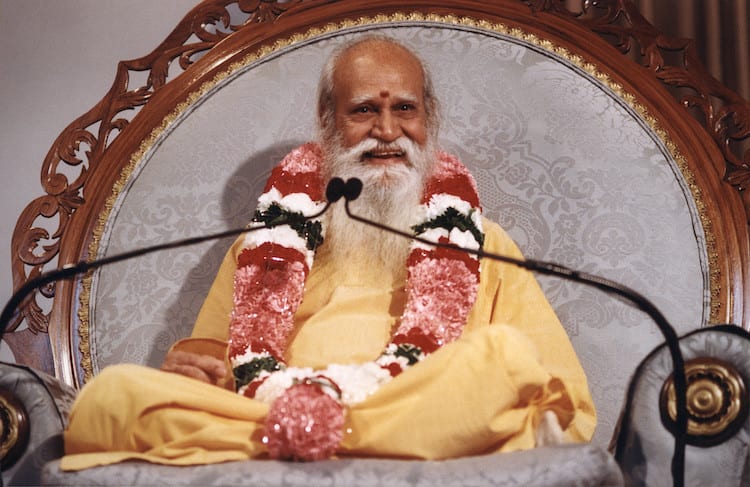“As the mind, so the person; bondage or liberation are in your own mind.
If you feel bound, you are bound. If you feel liberated, you are liberated.
Things outside neither bind nor liberate you; only your attitude toward them does that.”
QUESTION:
It seems so difficult to surrender and accept God’s Will with all that is happening to and around me. I want to surrender and be totally cheerful and happy every second by just letting go, but something in me keeps resisting, and it seems to be getting worse. Gurudev, what does it take to surrender, and is there a way it can be done quickly? This state is ghastly!
SRI GURUDEV:
Yes, it can seem difficult to surrender and accept God’s Will. We want to depend on our own strength, our own capacity to handle, and we don’t want to drop the attachment. If we don’t surrender, then better luck next birth! Surrendering is like taking hold of a pot that’s hot. What do we do? Do we say, “Ooo hoo! It’s hot! It’s hot! It’s hot! What am I to do?” and wait for an answer? If we’re going to wait for someone’s advice, the pot is not very hot. If it’s really hot, then we won’t even ask what to do; we will drop it. The fact that you’re still holding the pot and asking what to do means that it’s not hot enough. So, hold on until it really burns. You will know yourself when to drop it.
Surrender only comes at the point when everything else fails. If you still have a little hope of getting this, or doing that, even just that little hope is enough to keep God away. It is like the story of the man on the road who was being thrashed by some violent fellow and crying, “God, God, God, God, please help me, please help me, God!” With every blow the man shouted louder; God heard and was rushing to help him, but halfway there, He turned back. His wife asked, “Why did you come back? You rushed out in a hurry to save somebody.” “Yes, I was going there to save him but halfway there he started taking care of it himself. So I thought, he doesn’t seem to need me, and I came back.” “But he was calling, ‘God, God, God’.” “At the point when he started returning the blows himself, I saw he still had some energy. So, let him do it.”
God is a real taskmaster. If you really want to depend on Him, give up everything and say, “I don’t know. I can’t do anything anymore.” Then God’s help comes to you. Even an ounce of your own trust in yourself is enough to keep His help away. Surrender should be total and unconditional surrender. It naturally comes to us when we are ready. Even there, we see two types: the surrender of a baby monkey and that of a baby kitten. Both babies completely depend on their mother to move them from place to place. When the baby monkey wants to move, it holds onto its mother’s abdomen while she runs and jumps from tree branch to tree branch. If the monkey’s mother is careless when she jumps, then the fear of falling is in the baby’s heart while it holds onto its mother. The monkey baby depends on its mother for its movement and has to hold onto the mother by its own strength. Whereas when the kitten wants to move, all it has to do is give a little “meow.” Then the mother comes, bites its neck gently, and jumps from place to place. The kitten doesn’t have any worry about falling; the fear of dropping the kitten is in the mother’s heart. The kitten is totally, totally free from any fear. See the difference? Both babies depend on their mothers for movement and surrender to their mothers, but the baby monkey uses its own strength and depends on that; thus, the fear of falling is in the monkey baby’s heart.
There are those two types of surrender: “I hold onto you,” and “I cannot even hold onto you; you hold onto me.” The latter comes in our life at one time or other. It’s when everything else fails, we’re at the end of our wits, and nothing is working, that we begin to say, “Lord, I am Thine. All is Thine. Thy will be done.” Until that time what should we do? Try to do whatever you think is right, get tired of it, and then drop it. There’s a Tamil saying: “The pot was hot; the hand dropped it.” So, it comes naturally after every effort from us fails. It doesn’t matter if something in you keeps resisting and it seems to be getting worse; let it become worse. It must not be bad enough yet. One day you will know that it’s all for good. Even holding on with your own strength is for good, because that’s going to teach you a lesson—that ultimately it’s no good.
To quickly reach surrender and accept God’s will, hold on tightly. Or ask yourself while you’re still holding on with your own strength, “Am I being sensible or am I being foolish? Who is creating this situation? Who is not allowing me to surrender?” Then you will see it is you, no one other than you, who is keeping God’s help away. It’s like the monkey and coconut story. When people drink tender coconut, they cut a small hole into the shell, drink the coconut water through the hole, and then drop it in a field somewhere. There’s still a nice, soft jelly inside. It takes a big machete to cut it open, so sometimes we don’t take the time for that. The monkeys know that there’s a nice jelly inside, so they slowly put their hand inside the hole in the shell and grab all of that. Then, when they try to pull their hand out, what happens? The hand won’t come out. It seems like the coconut is holding the hand. He tries to run here and there with his tight fist still holding that nice jelly; he doesn’t want to drop it. When every effort fails, the monkey gets tired and faints. Then the grip slowly loosens, and the hand comes out.
In a similar way, we know that by letting go we can be released, but we don’t want to because the jelly is tastier. So we try harder and harder and harder, until we get in a fainted condition. Even then, letting go of the grip is not in our hands—that is where Grace comes in. When all your strength is gone, Grace takes over and makes you loosen your grip. But as long as you are making an effort, Grace won’t come and help you. So, consciously we should learn to live without that grip. We want to hold onto everything that comes to us. “I want it. I can’t leave it. I can’t live without it.” It’s a foolish notion. Consequently we suffer and suffering ultimately helps us; then the surrender comes naturally. You cannot even surrender by yourself, by your own will. “I am surrendering.” No. Surrender comes naturally, just as the baby surrenders to the mother. The baby doesn’t consciously surrender to the mother; it’s just natural.
There’s a Tamil saint who said, “Who can realize God if God doesn’t want us to realize?” Even to realize God, we need God’s Grace. Even to surrender ourselves to God, we need God’s Grace. How does Grace come? By putting all the impediments into our life and letting us get tired of all of them. Then, ultimately, when we drop all our efforts, Grace comes to save us. It’s only at that moment that we are totally surrendering ourselves.
QUESTION:
Please clarify a point about surrender: How do you know when it is right to surrender or when to take action? Or is it a balance one learns? Sometimes I feel I am surrendering to a situation, but maybe I am just stuck.
SRI GURUDEV:
While reading this question I am reminded of that wonderful prayer by Saint Francis: “Lord, when I face a situation give me the strength to correct it. If I cannot, give me the strength to accept it.” You don’t have to surrender right away; see how much strength you have and whether you can face and correct it. Try it. If it’s not possible to correct it, then surrender. You have to think of your strength, your capacity, and face the situation. Ultimately though, if everything fails, there’s no other way but to surrender. Surrender here means surrender to the higher will. It’s not that you give up. You give it to God. “God, I tried my best. I couldn’t do it anymore. I give it to You.”
In one part of the Mahabharata, Duryodhana’s brother was trying to disrobe the lady Draupadi in public. She was holding her sari cloth and shouting “Krishna, Krishna, Krishna, help me, help me!” Luckily, Indian women wear almost six rounds of sari. The man kept pulling more and more sari; all the rounds were almost gone. Then only the last round remained. All of a sudden the lady Draupadi realized that holding on was not going to save her. She threw up her hands and said, “I can’t take care of it myself. Krishna, only You can help me.” Once she surrendered to Krishna, more sari started coming. The man kept pulling and pulling, and as long as he pulled, the sari kept coming. Finally he got tired of pulling and gave up. That means, in a way, even your failure helps you to put your trust in a Higher Will. Don’t give up, but know that it’s impossible for your little effort to save you. There’s a Great Effort waiting to help you. God tests you this way. If you were really putting your faith in God, how would you prove it? “Okay Lord, let anything happen. Whatever it is, I leave it to you.” This kind of surrender doesn’t come that easily.
When we first began on the Kailash pilgrimage, we all trusted in our own capacity, our own strength, with some money in hand. Later, our strength started diminishing and our money was of no use to us because there were no shops from which to buy. What is the good of money if there are no shops? At one point you realize neither the money, nor your name, nor your fame, nor your physical strength is going to help you. At that point you put your entire faith in God. “God, if You want, let me come have Your darshan.” That’s what you call surrendering. Surrendering comes when every effort fails. But that doesn’t mean that you should not put forth your effort. There’s a well-known saying: “God helps those who help themselves.” Putting your faith in God is your final help. Nothing is impossible. Things happen without your expectation. So it’s better to surrender. If you can’t do that, something will make you surrender. When is it right to surrender and when to take action? The simple answer is: take action. When that becomes impossible, then surrender.
(From the May 2006, IYTA Newsletter)



